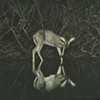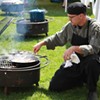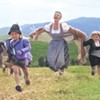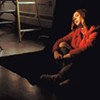Published July 19, 2006 at 2:54 p.m.
Just how do you celebrate someone's 250th birthday? When Wolfgang Amadeus Mozart reached the quarter-millennium mark in January, the event unleashed a global torrent of commemoration and celebration. The prolific wunderkind composer died when he was just 35 years old, but he left an astonishing 626 works behind - operas, symphonies, concertos, sonatas, choral music and more. This wondrous musical legacy has remained tremendously popular ever since, among classical music's cognoscenti as well as its casual fans.
The 33rd annual Vermont Mozart Festival, which opened Sunday, puts the focus squarely on the birthday boy himself, with three weeks of concerts highlighting the crown jewels of his career as well as some chamber-music gems. For the first two years after it began in the 1970s, the VMF programmed all-Mozart concerts. But as most Mozart fests do, it soon expanded to include a broadly defined range of the main man's musical ancestors and descendants, such as Johann Sebastian Bach and George Gershwin.
For VMF Artistic Director Mel Kaplan, celebrating the 250th meant aiming for variety "within the framework of doing an immense amount of Mozart repertoire." Kaplan also wanted to honor the composer by concentrating on "the two aspects of his writing that were the most important to him," he explains - his use of the piano and opera. "And so we did as much of both of those things as we could."
Several concerts feature international soloists well versed in keyboard: pianists Menahem Pressler and Jean-Claude Pennetier - who performs both with and without his Paris Piano Trio comrades. And while opera is a little trickier to incorporate in a mostly outdoor festival, conductor William Metcalfe - a VMF co-founder along with Kaplan - has arranged a condensed concert version of The Magic Flute to be performed from Shelburne Farms' South Porch.
A special twist on emphasizing Mozart's pianoforte - and paying tribute to the man behind the music - is a concert this Thursday called "In His Own Words." Cheryl Willoughby of Vermont Public Radio will read excerpts from Mozart's letters between performances of several violin and piano sonatas. Violinist Harumi Rhodes, the festival orchestra's concertmaster, and veteran VMF keyboardist Elizabeth Metcalfe join Willoughby for the intimate evening at Richmond's Round Church.
By using the violin and piano pieces, "We encompassed the lifetime of composition through the program," says Kaplan. The sonata selections span Mozart's composing career from childhood whiz kid to mature master. He wrote the first one on the program at age 7, the last one just three years before he died.
Willoughby felt the sonatas and letters fit well together as a way to look more deeply at Mozart's story. "One of my personal passions in life is looking at where music came from," she says. She's intrigued by the "connection between the real world" and art - how aspects of culture and history inspired individual creators or influenced entire movements.
Following Mozart's life through the sonatas he wrote and the letters that correlate with them "seemed like a natural journey, a natural path to take," Willoughby says. To select excerpts for the concert, she reviewed all of Mozart's extant letters. "Reading them, you get an incredible insight to his character: how he thought, what he thought about his own music," she says.
And the composer was a prolific correspondent, in part because he spent almost a third of his life on the road, performing abroad from the age of 5. His first "letters," according to Willoughby, are actually "postscripts to his father's letters - he was so young," in which he sent greetings back home to his mother or sister.
The letters grew to include "a lot of very colorful images of where he was traveling and who he met," Willoughby continues. "And anecdotes about other composers - oftentimes very funny, cutting remarks about their musicality or the Emperor Joseph's ability - or lack of ability - with music."
The charm that shines through so much of Mozart's musical writing also comes through in his words, Willoughby notes. "He was a wonderfully funny man. He was acute and keen, thoughtful and insightful with the people around him, very aware. He strikes me as incredibly bright -- sharp, so playful."
While the smart and silly side of Mozart is familiar to many, some of his letters reveal a more emotionally complex man than is commonly known. "He had a deep family life -- a very deep connection with his sister," Willoughby reports. "And when he finally married Constanze, he made a beautiful appeal to his father, who didn't approve of the marriage for various reasons." At age 25, Wolfgang wrote his father a passionate defense of his bride. "The voice of nature speaks as loud to me as in others, louder, perhaps, than in many a big strong lout of a fellow."
The most poignant epistle comes from three years earlier. Mozart's mother died while traveling abroad with her son, and the 22-year-old Wolfgang wrote to his family's chaplain in Salzburg. He wanted the priest to tell his father and sister only that his mother was gravely ill, so that Mozart would have time to return home and break the bad news himself. "I beg you . . . watch over my father for me and try to give him courage so that, when he hears the worst, he may not take it too hardly."
For Willoughby, this letter is the emotional high point of the program. "It is very revealing in many ways -- his love for his mother and his father and his sister; his appeal to his abbot to try to cushion the blow, to prepare them for it," she says. "It's a great insight into the relationship he had with his father, which has been portrayed as antagonistic at times."
On the program, this letter is followed by the stirring Sonata No. 21 in E minor for violin and piano, which the composer wrote shortly after his mother died. While many of the pieces he penned at this point in his career were commissions meant to please specific clients, "This comes straight from the heart, not the pocketbook," says Willoughby. "It's very powerful music." Paired together, the letter and the sonata constitute "one of the rare personal insights we have to Mozart."
Willoughby hopes this words-and-music format proves popular. "I'd like to think that the letters will add a dimension of understanding," she says, especially "for people who may know Mozart in one way -- the guy with the off-kilter wig sitting on the piano bench making jokes and playing backwards." She and Kaplan are already cooking up a similar program as part of the festival's Winter Series. It's scheduled for January 27, 2007 -- the day everyone's favorite Austrian turns 251.
Mozart's Birthday Gift
In honor of the composer's big birthday, Seven Days asked a few Vermont Mozart Festival musicians: What's the best gift Mozart has given you -- a favorite piece or challenging passage, for example? What does this "gift" mean to you, personally or professionally?
PATRICK WOOD, VIOLIN
"That's easy. The gift he's given me is the knowledge that something profound can be expressed in music without unnecessary complexity or anxiety -- something which makes everyone feel both more human and better humans than they were before. There's not much more that anyone can ask."
DOV MICHAEL SCHILLER, PERCUSSION
"Mozart's Viennese Sonatina No. 4 has always been dear to my heart. When I was 13 years old I memorized this piece, and have always been able to soothe both myself and my children with these sounds and rhythms."
WILLIAM METCALFE, CONDUCTOR
"In the "Jupiter Symphony," there is one short passage of modulation which is both perfectly straightforward and an example of absolute genius at work -- pure magic, it never fails to give me the shivers!"
DAVETTA FARIA, VIOLIN
"I once had a parakeet, Yehudi -- named for Yehudi Menuhin -- that chirped along enthusiastically each time he heard Mozart, either on radio, recording or when I was practicing something by this composer. Did he do the same with other composers? Yes, a few, and only sometimes, but Mozart elicited this pure and enthusiastic response always. Could it be that Mozart's genius sometimes spills over into the animal kingdom as well? I can only speak for one parakeet, but my answer would be yes."
More By This Author
Speaking of...
-

Rain Curtails Historic 'Sound of Music' Concerts
Jun 22, 2024 -

Two Local Band Directors March in the Macy's Parade
Nov 22, 2023 -

Before a Burlington Show, the Wood Brothers Get Back to Basics
Oct 26, 2023 -

After a Half-Century of Leading Local Ensembles, Steven and Kathy Light Prepare a Musical Farewell
May 3, 2023 -

Double E 2023 Summer Concert Series Kicks Off With the Wailers
Mar 17, 2023 - More »
Comments
Comments are closed.
From 2014-2020, Seven Days allowed readers to comment on all stories posted on our website. While we've appreciated the suggestions and insights, right now Seven Days is prioritizing our core mission — producing high-quality, responsible local journalism — over moderating online debates between readers.
To criticize, correct or praise our reporting, please send us a letter to the editor or send us a tip. We’ll check it out and report the results.
Online comments may return when we have better tech tools for managing them. Thanks for reading.










































